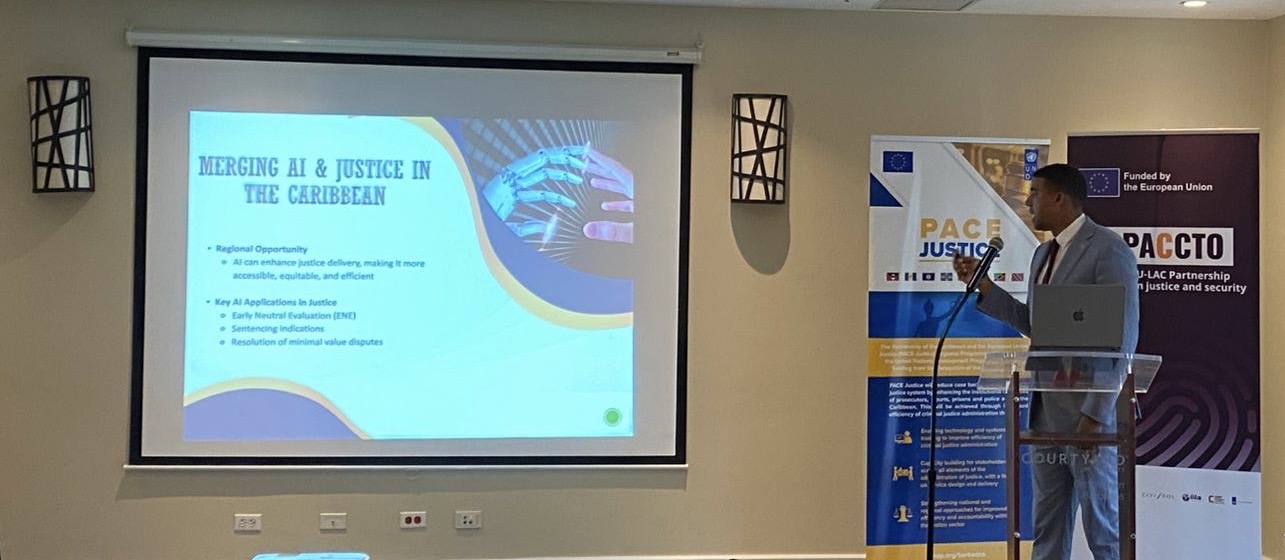AI-Driven Justice Reform in Saint Kitts and Nevis Presented at UNDP-EU Workshop
Saint Kitts and Nevis is pioneering a digital revolution in its justice system, leveraging artificial intelligence (AI) to address long-standing challenges and enhance access to legal information. Attorney General Garth Wilkin showcased the nation’s innovative approach at a recent UN-backed workshop, emphasizing the potential of AI to transform Caribbean jurisprudence. This ambitious strategy centers around the deployment of VoiceIt, a locally developed AI legal assistant, marking a significant step towards a more accessible and efficient justice system. The twin-island Federation’s proactive embrace of technology positions it as a regional leader in digital justice reform, offering a potential blueprint for other Caribbean nations grappling with similar issues.
Central to Saint Kitts and Nevis’s digital justice reform strategy is VoiceIt, the Caribbean’s first government-deployed AI legal assistant. This innovative platform provides free, readily understandable legal guidance to the public via easily accessible channels like WhatsApp and web chat. Trained on the specific laws of Saint Kitts and Nevis, VoiceIt offers tailored legal information, demonstrating the potential of AI to bridge the gap between complex legal jargon and public understanding. The tool’s rapid uptake, with over 2,000 public interactions in just three months, underscores the demand for accessible legal information and validates the government’s strategic investment in AI-driven solutions. This initiative positions Saint Kitts and Nevis at the forefront of leveraging technology to empower citizens with legal knowledge.
Beyond VoiceIt, the government’s digital justice reform agenda encompasses a comprehensive modernization effort. This includes a strategic partnership with the Caribbean Agency for Justice Solutions (CAJS) aimed at overhauling records management, automating legal document processing, and strengthening institutional capacity. This multifaceted approach signifies a commitment to not just isolated technological solutions, but a systematic transformation of the justice system. By integrating various digital tools and strategies, Saint Kitts and Nevis aims to create a more streamlined, efficient, and transparent legal system that better serves the needs of its citizens.
Attorney General Wilkin highlighted the importance of a responsible and ethical approach to AI implementation in the justice system. He emphasized that AI should augment, not replace, human legal judgment. This focus on ethical considerations underscores a commitment to ensuring that technological advancements enhance, rather than undermine, the integrity of the legal process. Wilkin also advocated for regional collaboration on digital justice infrastructure, emphasizing the need for shared ethical standards and harmonized data systems across Caribbean nations. This collaborative approach is crucial for fostering a cohesive and effective regional justice framework that leverages technology while upholding fundamental legal principles.
The presentation by Attorney General Wilkin provided a compelling case study for the potential of AI to revolutionize justice systems in the Caribbean. He illustrated how AI can address critical challenges such as court backlogs and limited access to legal information, contributing to a more efficient and equitable justice system. This underscores the importance of embracing innovation and adopting new technologies to modernize and improve legal processes. By proactively exploring and implementing AI-driven solutions, Caribbean nations can pave the way for more accessible, efficient, and responsive justice systems that better serve their citizens.
The workshop served as a valuable platform for sharing best practices and fostering regional collaboration on digital justice reform. Bringing together experts from across Latin America, the Caribbean, and Europe, it facilitated a crucial dialogue on the responsible and effective implementation of AI in the justice sector. The discussions emphasized the need for a nuanced approach, balancing the transformative potential of AI with ethical considerations and the imperative of human oversight. This collaborative exchange of knowledge and experience is essential for shaping a future where technology empowers justice systems to be more efficient, accessible, and equitable for all.
Share this content:












Post Comment